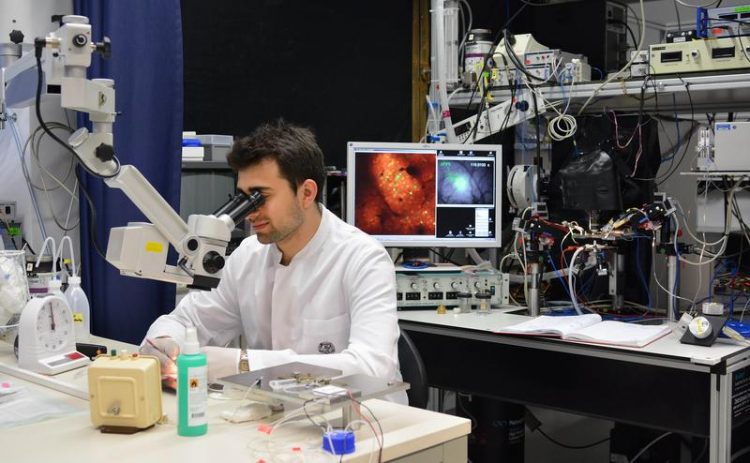Solving biomedical problems by use of optical tools

The new master's programm Medical Photonics at the University Jena will impart a broad basic knockledge and deep insights into microscopy, spectroscopy and diagnostics. Photo: Michael Szabo/UKJ
When Robert Koch discovered the tuberculosis pathogen more than 100 years ago he was using a Zeiss microscope equipped with an immersion lens developed by Ernst Abbe.
Today physicochemists and intensive care physicians from Jena University work on novel spectroscopic techniques for infection diagnostics. All over the world, scientists are developing new optical methods in order to better understand life processes, and to facilitate early diagnosis and optimized treatment of widespread diseases like cancer or Alzheimer’s.
“Working in the field of Medical Photonics requires a broad basic knowledge in the field of bio-medicine as well as in natural sciences and mathematics – and of course also a deep insight in microscopy, spectroscopy and diagnostics including their clinical applications”, says Christoph Biskup, professor for biomolecular photonics at Jena University Hospital.
This statement is a precise summary of the new “Master of Science programme in Medical Photonics” offered at Jena University. The curriculum for the “Medical Photonics” master’s programme was developed at the Center for Medical Optics and Photonics by Biskup in collaboration with experts from the Medical Faculty, Faculty of Chemistry and Earth Sciences and the Faculty of Physics and Astronomy. The Medical Photonics master’s programme will start in the winter term 2016/2017.
International orientation – unique in Germany – characteristic for Jena
Christoph Biskup: „We’d like to address not only graduated bachelors of natural and life sciences but also physicians. Students will start with modules in human biology or physics and chemistry in order to strengthen their professional knowledge.” After that, basic courses in programming, digital imaging and statistics will be done, followed by modules for deepening the students’ skills.
Lectures and exercises are complemented by practical lab training. In the second year, students can focus on selected topics in fields of medical photonics such as microscopy, spectroscopy and clinical application of optical and photonic techniques. Integral part of the programme is also a scientific internship in a lab group at the university, at a non-university research institute or in a research-oriented company. Finally, the programme will be completed by preparing and defending the master thesis.
Since the new master’s programme is open for students from all over the world, all lectures will be given in English. “With its combination of optics and life sciences, this master’s programme is unique in Germany and rare on an international level”, says Christoph Biskup and emphasises the growing need for highly skilled graduates. “Our students will get to know optical methods as an important tool in biomedical research and clinical use, and they will not only be taught how to implement these methods but also how to further develop them. The master’s degree will qualify graduates for PhD programmes and of course for highly skilled jobs in research-oriented companies in the field of optics, medical devices and life sciences – in all these areas there is an increasing demand for highly qualified staff.”
Both career opportunities are possible internationally but also on-site in Jena: The Abbe School of Photonics and the Jena School of Molecular Medicine offer PhD-programmes, and the local optics and photonics industry has a high demand for specialists.
The master’s programme in a nutshell:
Admission requirements: first degree in Chemistry, Physics, Biology, Biochemistry/Molecular biology, Medicine or equivalent with at least a grade of “good”
Duration: 4 semesters (full time)
Fees: none
Teaching language: English
Application: 1 April to 31 May, to the Master-Service-Centre at Friedrich Schiller University Jena
Additional information: http://www.medpho.uniklinikum-jena.de/en.html
Contact:
Dr. Holger Babovsky
Programme coordinator
Tel.: +49-3641-947660
email: holger.babovsky[at]uni-jena.de
Prof. Dr. Christoph Biskup
Biomolecular Photonics Group
Friedrich Schiller University Jena / Jena University Hospital
Tel. +49 3641 9397800
email: christoph.biskup[at]uni-jena.de
http://www.medpho.uniklinikum-jena.de/en.html
http://www.master.uni-jena.de
http://www.uni-jena.de
Media Contact
All latest news from the category: Health and Medicine
This subject area encompasses research and studies in the field of human medicine.
Among the wide-ranging list of topics covered here are anesthesiology, anatomy, surgery, human genetics, hygiene and environmental medicine, internal medicine, neurology, pharmacology, physiology, urology and dental medicine.
Newest articles

Properties of new materials for microchips
… can now be measured well. Reseachers of Delft University of Technology demonstrated measuring performance properties of ultrathin silicon membranes. Making ever smaller and more powerful chips requires new ultrathin…

Floating solar’s potential
… to support sustainable development by addressing climate, water, and energy goals holistically. A new study published this week in Nature Energy raises the potential for floating solar photovoltaics (FPV)…

Skyrmions move at record speeds
… a step towards the computing of the future. An international research team led by scientists from the CNRS1 has discovered that the magnetic nanobubbles2 known as skyrmions can be…





















